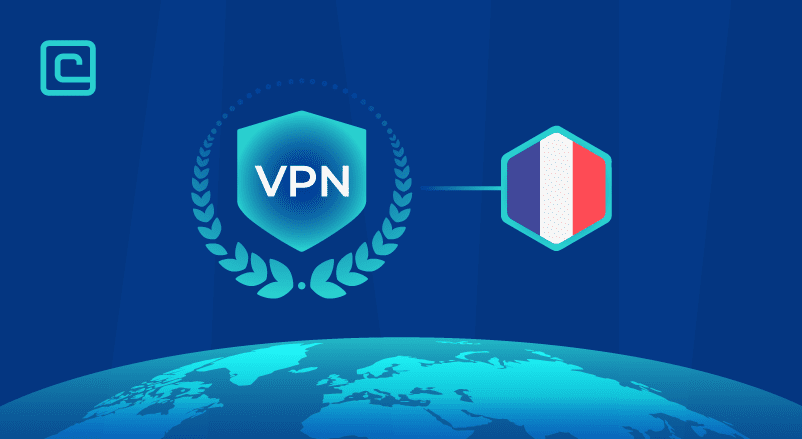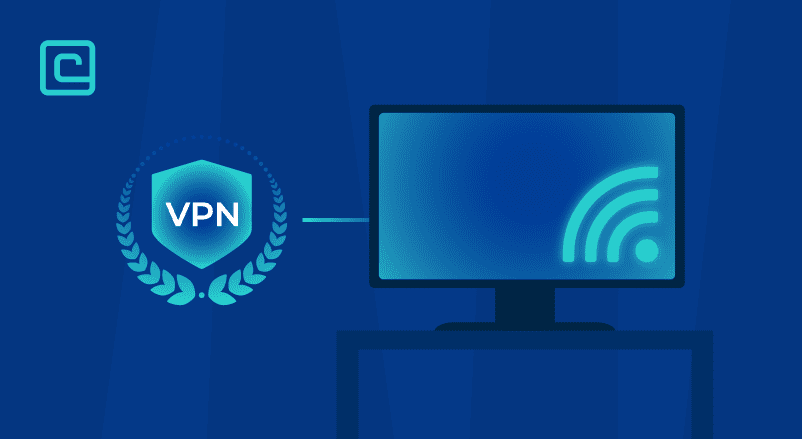Can VPNs Steal Your Passwords Or Personal Data?
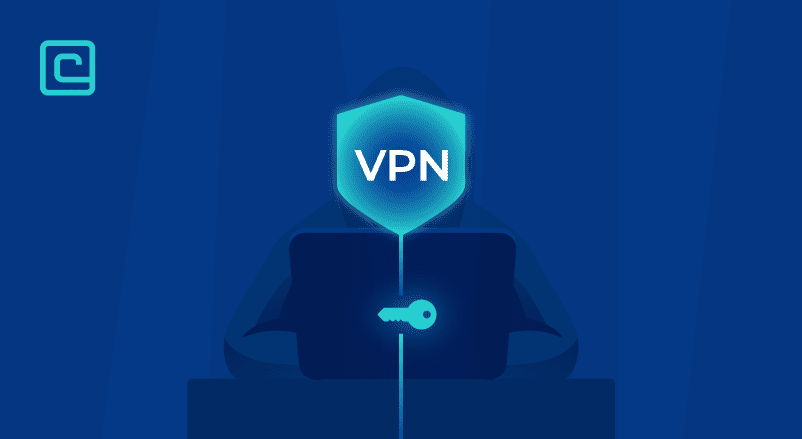
A VPN is a great tool for keeping your personal data safe from hackers. But, it’s important to know that using the wrong service can put your data at risk. So, can a VPN steal your passwords? And can it see all your private data?
A VPN can infect your device with malware, steal your private information, or even sell your data to third parties. Many VPNs have been caught betraying their users for profit.
Not every VPN is bad, though. But, it’s crucial to choose a trusted VPN to protect you. If you’re concerned about VPNs stealing your data, keep reading to find out how and how to avoid it.
Can a VPN See Your Personal Data?
In theory, a VPN provider could see all your data. But, not all information is accessible. The type of data a VPN can see depends on the connection security. It’s rare for a reliable VPN to spy on your data.
Test Your VPN Knowledge – Take A Quiz!
How Can a VPN Steal Your Private Data?
Yes, a VPN provider can see your private information. But, it’s not simple for them to do so, even when they control your internet traffic. Here are a few ways a VPN might steal your data:
- Intercepting HTTP connection to a website
- Forging or faking certificates
- Intercepting HTTP connection
Long ago, an insecure HTTP protocol was used to connect to websites. This protocol sent messages in plain text between browsers and servers. HTTP is still the base for many internet connections.
Since all HTTP messages are readable by humans, they can be easily stolen. To solve this, HTTPS (S stands for Secure) was created. All HTTPS traffic is encrypted, making it impossible for anyone to see the data. Modern browsers show a lock symbol when you visit a website using HTTPS:
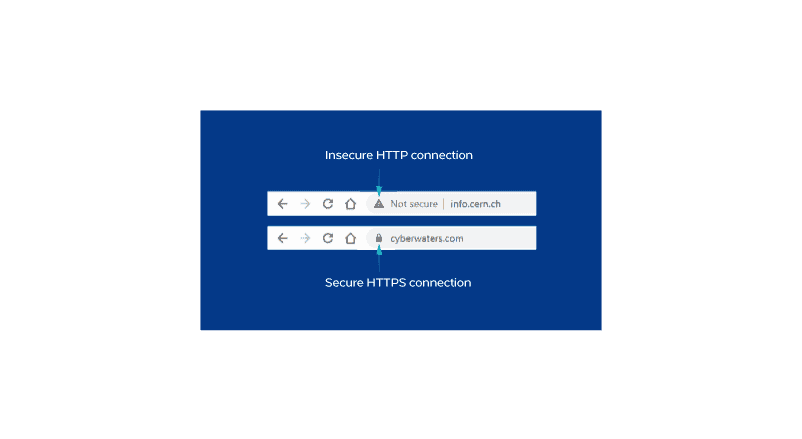
Can a VPN app steal your data? Today, some websites still use the old HTTP instead of HTTPS. This means all your passwords and personal info can be seen by a VPN. But, if a site uses HTTPS, even a VPN can’t read it.
HTTPS uses certificates for encryption. A VPN encryption adds an extra layer on top of HTTPS. Here’s a simple way to understand it:
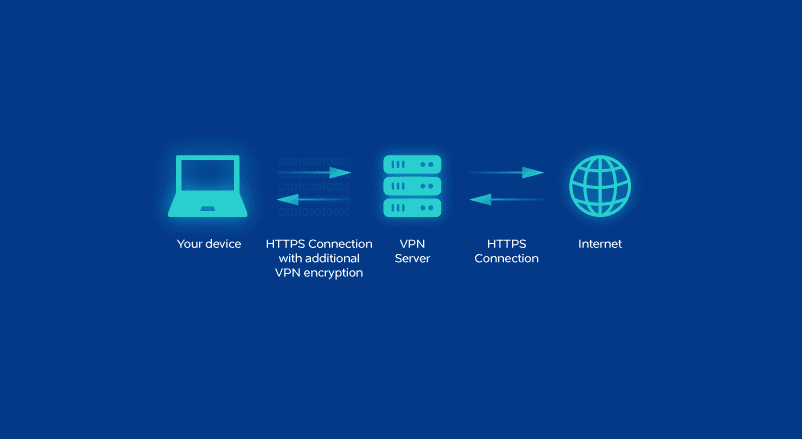
How VPN works with HTTPS connection
Can a VPN See Your Passwords?
VPNs use double encryption to keep your data safe from ISPs and hackers. Even HTTPS is secure, but a VPN can crack it. They do this by installing their own certificates on your device.
Installing fake certificates needs admin rights. A VPN might offer a malicious app to do this. This lets them see your HTTPS traffic and send it to websites without you knowing.
Shady VPNs, often free or from China, use this method. But, reputable VPNs won’t do this, so your passwords are safe.
Can VPN See Your Banking Login Credentials?
It’s hard for a VPN to break into a bank’s security. So, they can’t see your banking login details. Banks and services like PayPal follow strict security rules. They always use secure connections when you log in.
Can VPN Steal The Passwords That You Type?
A VPN can’t steal your password if a website uses HTTPS. But, if a site uses HTTP, your password can be seen. Typing your password into a field doesn’t expose it to a VPN.
VPNs can’t see your keystrokes. They’d need malware on your device, which your antivirus would catch. So, whether a VPN can steal passwords depends.
If a VPN installs malware or you enter info on an unsecured site, yes. But, secure sites protect your password, even from VPNs.
Free VPNs Steal and Sell Your Data
Free VPNs and proxies often steal your data. They can’t make money by running a VPN service for free. They sell your personal info to third parties and advertisers. Free VPNs are not trustworthy and shouldn’t be used for privacy.
Also, avoid VPNs from China. China heavily censors content and tracks online activities. Only government-approved VPNs are allowed there. Chinese VPNs collect user data.
History of VPNs Stealing Users’ Data
Let’s look at some VPNs that have stolen user data in the past:
Hola VPN
In 2016, Hola was a popular free VPN with over 100 million users. But, it was later found to be untrustworthy and dangerous.
Hola’s privacy policy was very invasive. It logged lots of personal info without consent. It even stored users’ IP, email, and website visits. If you logged in through social media, it could also collect your pictures and address.
Worst of all, Hola hijacked users’ Internet connections. It used botnets and other resources from users’ devices.
Betternet
Betternet is often seen as one of the most disappointing VPNs today. It was once promising but has lost its shine. It hasn’t been caught in as serious issues as Hola VPN, but it’s still risky to use.
Betternet has shared user data with third parties before. Its apps are also full of malware. The Android app is among the most infected with malware. This makes it clear to avoid Betternet.
Touch VPN
Touch VPN is very popular, with a 4.3 rating on Google Play from over 800,000 reviews. But, its privacy policy is very intrusive. It logs a lot of personal info and uses weak encryption.
It’s based in the US and has serious leaks. This makes it a bad choice for users. Touch VPN should be avoided.
Psiphon VPN
In 2018, a malware framework was found in Psiphon VPN’s Android files. This malware could log messages, collect GPS, and steal data. It’s scary that the Android app has over a hundred million downloads.
The malware was hidden and could do a lot of harm. It’s a big reason to stay away from Psiphon VPN.
SuperVPN
SuperVPN can unblock many geo-restricted sites. But, it’s not worth it because its apps are full of malware. In 2017, researchers found malware that let hackers steal personal info and credit card details.
This shows how dangerous SuperVPN can be. It’s not a safe choice for users.
Which VPNs are Trustworthy?
It’s always best to pick the one that has an audited and proven No-Logs policy. Besides that, here’s what makes a VPN trustworthy:
- Well-known name and long reputation in the business
- Strict and proven no-log policy
- Based in a country out of surveillance alliances
- Advanced privacy protection features
- Reliable customer staff
Three Most Trusted VPNs
1. NordVPN

| 🌐 Website: | nordvpn.com |
| 🏢 Headquarters: | Panama |
| 📍Servers/Countries: | 5800+ servers in 60 countries |
| ₿ Accepts Cryptocurrency | Yes |
| 💸 Deals & Coupons | Get 68% off + 3 months extra |
NordVPN is considered the top VPN and the most trusted VPN on the market. It has a great reputation and meets all the criteria for a reliable VPN. It’s based in Panama, is regularly audited, and doesn’t keep any logs on its users. You can even pay in cryptocurrency to stay anonymous when signing up with NordVPN.
This VPN has over 5,500 servers in 59 countries. Almost all servers use the NordLynx protocol. This protocol ensures top privacy and speeds up to two times faster than others.
NordVPN’s servers also offer obfuscation and Double VPN for extra privacy. You get split tunneling, kill switch, and full leak protection to keep your data safe.
NordVPN has a Dark Web Monitor that alerts you if your private info is leaked. It also lets you set up multi-factor authentication for app security.
Pros
- Thousands of lightning-fast and well-optimized servers
- Unblocks all the major streaming sites
- Fully supports Torrenting and P2P
- Strict no-logs policy and RAM-disk servers
- Ad blocker and malware protection features
- Robust security features and military-grade encryption to protect you from DDoS attacks and other online threats
- 24/7 live chat support
- 30-day money-back guarantee
Cons
- Only 6 simultaneous connections
- No free trial
2. ExpressVPN

| 🌐 Website: | expressvpn.com |
| 🏢 Headquarters: | The British Virgin Islands |
| 📍Servers/Countries: | 3000+ servers in 94 countries |
| ₿ Accepts Cryptocurrency | Yes |
| 💸 Deals & Coupons | +3 months FREE! |
ExpressVPN is one of the safest and most trustworthy VPNs. It has kept a clean record for over a decade since starting in 2009. The service is based in the British Virgin Islands. This place has its own privacy laws and isn’t part of any surveillance group.
This VPN has thousands of servers across 94 countries. It uses RAM-based servers, just like our previous pick. Plus, it has TrustedServer tech. This tech clears data on every reboot and doesn’t store anything on hard drives.
ExpressVPN has its own protocol called Lightway. This open-source protocol is open for anyone to check. With features like a kill switch, split tunneling, and private DNS on every server, ExpressVPN offers top-notch protection.
Pros
- Works with streaming
- Supports torrenting
- No-logs policy
- TrustedServer technology with RAM-only servers
- Premium security features
- 30-day money-back guarantee
Cons
- Expensive subscription plans
- Only 5 simultaneous connections
3. VyprVPN
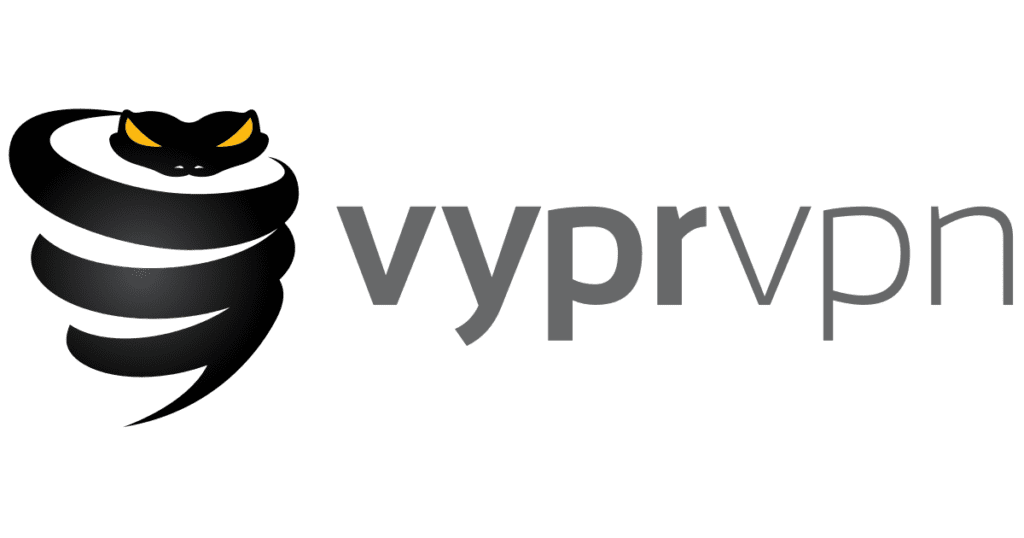
| 🌐 Website: | vyprnvpn.com |
| 🏢 Headquarters: | Switzerland |
| 📍Servers/Countries: | 700+ servers in 64 countries |
| ₿ Accepts Cryptocurrency | Yes |
| 💸 Deals & Coupons | Get 50 %OFF Now! |
VyprVPN has over 700 servers in more than 70 locations worldwide. It offers over 300,000 available IP addresses. This VPN service includes DNS leak protection, IP protection, and WebRTC leak protection. It also has advanced features like split tunneling and a kill switch.
VyprVPN runs everything in-house. This means no third parties are involved. It ensures your data is safe. Plus, VyprVPN doesn’t log any personally identifiable information.
VyprVPN is based in Switzerland, known for its privacy. The only downside is its high monthly price. But, if you want great privacy, VyprVPN is worth it.
Pros
- Audited No-Log VPN
- High-speed streaming support
- Hides VPN traffic with Chameleon technology
- Strong security and encryption
- 24/7 customer support
- 30-day money-back guarantee
Cons
- A bit expensive
- Limited iOS and Linux apps
Conclusion
Choosing an unreliable VPN can harm your online privacy. It’s crucial to pick a service carefully.
A trustworthy VPN keeps your private info and passwords safe. There are reputable VPN providers with strict no-log policies.
For private browsing, stick with our top three recommendations. They don’t log your activity and have never stolen user info. Your private information is safe with them.
Personal Data and VPNs FAQs
Should I use a free VPN to protect my data?
Don’t use a free VPN for data protection. Free VPNs are common online, but it’s hard to check their history. They might have malware, log your data, and sell it.
Can a VPN track my online activity?
Yes, some VPNs log your online activity. This is common in free VPNs, but paid ones can also do it. Always check the VPN’s privacy policy to see what it collects. A no-logs policy is best.
What data can a VPN steal?
A bad VPN can steal a lot of data. They can take your password, banking info, real name, and address. This data can cause financial loss or legal trouble.
References:
Cybersecurity and VPN researcher
